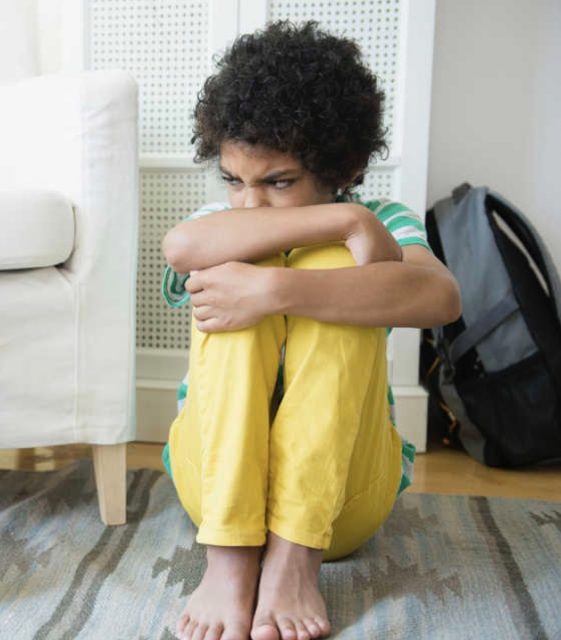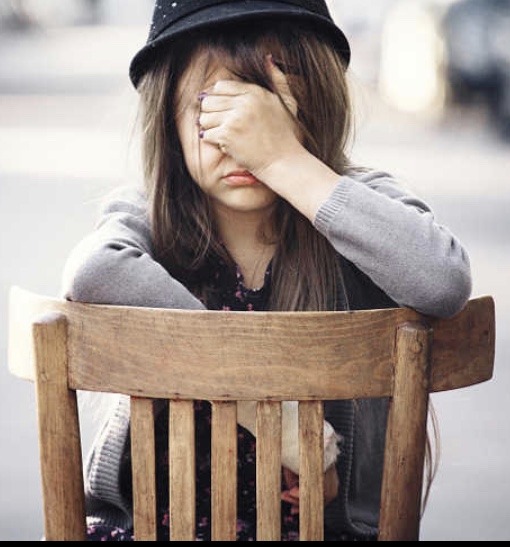It can be very overwhelming to know what to do when your child seems depressed at school.
“Frankie, what I am going to do with you?” Frankie’s mother sighs, as she wonders these thoughts aloud. Frankie is a 9-year-old boy attending a new school. His family moved from out of state recently, and he has no friends in his new school. He doesn’t want to go to school most days. He’s always been shy, and has a hard time asking for help. He only wants to play on his i-pad or with his video games.

Recently, his mother has been even more concerned. Frankie doesn’t seem to have any energy. His teacher, who is kind and supportive, reports that he won’t play at recess, preferring to isolate himself away from other children. He is tearful at school. Although he is bright, scores poorly on tests and assignments. He rushes through his work, or refuses to do it. At home, he is tearful, and doesn’t have the energy to play like he used to. He reports that he misses his old school and his old friends. Frankie cries a lot in the evenings, asking his parents to move back to their old neighborhood. He calls himself, “stupid,” and says things like, “I’m such a loser. Who would want to be my friend anyway?” He’s arguing, irritable, and unpleasant, which is unlike his typical carefree demeanor.
Frankie is demonstrating symptoms of Depression. Depression is a common disorder in childhood, with 3-10% of children being diagnosed with it at some point in their school-aged years. His parents are correct in being concerned. Depression can have long-term social and emotional impact if not properly treated, including self-harming behaviors, social rejection, and lowered academic achievement.
Treatment often involves psychotherapy. Psychotherapy teaches children skills to manage symptoms, gain support, and relate better to peers. It often involves parents to help support the child in new ways of thinking and reacting to stress and difficulty. Parents may also guide the child to find new ways of enjoying life, exercising, and staying socially active. Psychiatric medications, typically antidepressants, are often prescribed when clinically necessary, to improve a child’s quality of life. A final area of treatment is school involvement, particularly in cases like Frankie’s, where the symptoms are impacting school performance.

What kinds of things can schools do to help a child with Depression?
Before a school can help a child, they need to understand
It can be helpful for the school to know and understand how much the child is struggling. This can be particularly helpful for children with depression, as they tend to internalize symptoms of depression.
Parents can help schools understand in different ways
They may choose to talk to the child’s teacher to make him or her aware of the challenges that their child is facing, as well as what they are trying at home to help. Oftentimes, these conversations are instrumental in helping the child at school, and bringing the concerns to the teacher’s awareness. Another way to make schools aware is to ask for a meeting with the principal, counselor, school-family liaison, and teacher together. These types of meetings can be more formal, but often help to make sure that everyone is working together for a child’s success. More formal meetings are recommended when children or teens are in crisis.
Brainstorm possible school interventions
- For example, increasing exercise or physical movement can help to decrease a child’s sluggishness, irritability and restlessness. Typical supports could include transporting things to the school office, standing at a desk if needed, or regular movement breaks.
- If social interactions are strained or difficult, regular “lunch bunch” or peer meetings can be helpful to cement supportive friendships and increase social confidence.
- Additionally, scheduling “pleasant events” or things that the child likes to do throughout the day may lift his spirits and increase his energy throughout the day.
- Moreover, increased support and praise for good effort, reaching out to peers, or appropriate communication can also be quite helpful.
- Finally, a strong relationship with a school staff member can be instrumental, even if it is not the child’s teacher.

Be patient
Successful treatment of depression can take weeks and months before things turn around. Oftentimes, if children feel pressured to “get better” too quickly, it can make the symptoms worse. It will be important to educate teachers and school personnel that your child is trying, and help them to see your child’s progress, even if it is slow. Most medications that target symptoms of depression can take weeks for improvement to be observed. As frustrating as it can be for teachers and parents, it is important to remember it is equally frustrating for the child. They will need your support until they are feeling better.
![]()
